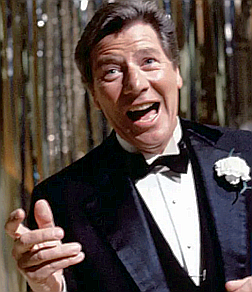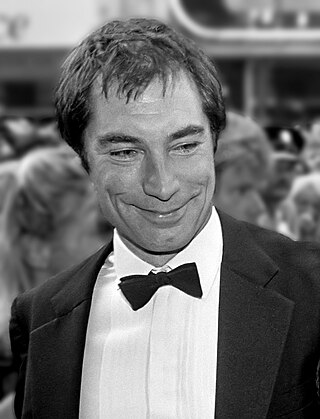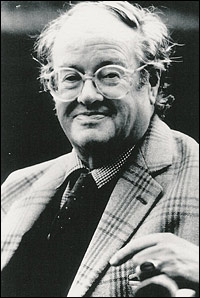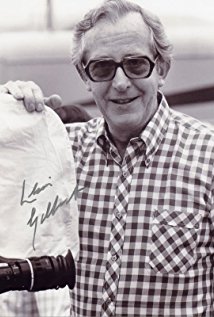Related Research Articles

The oldest known surviving film was shot in the United Kingdom as well as early colour films. While film production reached an all-time high in 1936, the "golden age" of British cinema is usually thought to have occurred in the 1940s, during which the directors David Lean, Michael Powell, and Carol Reed produced their most critically acclaimed works. Many British actors have accrued critical success and worldwide recognition, such as Audrey Hepburn, Olivia de Havilland, Vivien Leigh, Glynis Johns, Maggie Smith, Laurence Olivier, Michael Caine, Sean Connery, Ian Mckellen, Joan Collins, Judi Dench, Julie Andrews, Daniel Day-Lewis, Gary Oldman, Emma Thompson, Anthony Hopkins, Peter O’Toole and Kate Winslet. Some of the films with the largest ever box office returns have been made in the United Kingdom, including the fourth and fifth highest-grossing film franchises.

Alfred Hawthorne "Benny" Hill was an English comedian, actor, and scriptwriter. He is remembered for his television programme, The Benny Hill Show, an amalgam of slapstick, burlesque and double entendre in a format that included live comedy and filmed segments, with Hill at the focus of almost every segment.

Walter William "Max" Bygraves was an English comedian, singer, actor and variety performer. He appeared on his own television shows, sometimes performing comedy sketches between songs. He made twenty Royal Variety Performance appearances and presented numerous programmes, including Family Fortunes between 1983 and 1985. His catchphrase "I wanna tell you a story" became an integral part of his act, although it had originated with comedian Mike Yarwood impersonating Bygraves.

Timothy Leonard Dalton Leggett is a British actor. He gained international prominence as the fourth actor to portray fictional secret agent James Bond in the Eon Productions film series, starring in The Living Daylights (1987) and Licence to Kill (1989).

Laurence Harvey was a Lithuanian-born actor. He was born to Lithuanian Jewish parents and emigrated to South Africa at an early age, before later settling in the United Kingdom after World War II. In a career that spanned a quarter of a century, Harvey appeared in stage, film and television productions primarily in the United Kingdom and the United States.

Sir John Clifford Mortimer was a British barrister, dramatist, screenwriter and author. He is best known for short stories about a barrister named Horace Rumpole, adapted from episodes of the TV series Rumpole of the Bailey also written by Mortimer.

Richard Lester Liebman is a retired American film director based in the United Kingdom, famous for his comedic and campy style of shooting movies and for his work in both US and UK cinema.

UTV is the ITV region covering Northern Ireland, ITV subsidiary and the former on-air name of the free-to-air public broadcast television channel serving the area. It is run by ITV plc and is responsible for the regional news service and programmes made principally for the area by the UTV production team. It currently uses the network ITV1 channel with an opt-out service for local advertising and on-air promos for local programming.

World in Action was a British investigative current affairs programme made by Granada Television for ITV from 7 January 1963 until 7 December 1998. Its campaigning journalism frequently had a major impact on events of the day. Its production teams often took audacious risks, and the programme gained a solid reputation for its often-unorthodox approach. The series was sold around the world and won numerous awards. In its heyday, World in Action drew audiences of up to 23 million in Britain alone, equivalent to almost half the population.

The Wednesday Play is an anthology series of British television plays which ran on BBC1 for six seasons from October 1964 to May 1970. The plays were usually original works written for television, although dramatic adaptations of fiction also featured. The series gained a reputation for presenting contemporary social dramas, and for bringing issues to the attention of a mass audience that would not otherwise have been discussed on screen.

Lewis Gilbert was an English film director, producer and screenwriter who directed more than 40 films during six decades; among them such varied titles as Reach for the Sky (1956), Sink the Bismarck! (1960), Alfie (1966), Educating Rita (1983) and Shirley Valentine (1989), as well as three James Bond films: You Only Live Twice (1967), The Spy Who Loved Me (1977) and Moonraker (1979).
Robert James Leslie Halliwell was a British film critic, encyclopaedist and television rights buyer for ITV, the British commercial network, and Channel 4. He is best known for his reference guides, Filmgoer's Companion (1965), a single volume film-related encyclopaedia featuring biographies and technical terms, and Halliwell's Film Guide (1977), which is dedicated to individual films.
Douglas Scott Botting was an English explorer, author, biographer and TV presenter and producer. He wrote biographies of naturalists Gavin Maxwell and Gerald Durrell. Botting was the inspiration behind and writer of the 1972 film The Black Safari, a role-reversal parody of English explorers, with Africans touring England, shown in the BBC 2 documentary series The World About Us. He also featured in much other BBC programming, including Under London Expedition exploring the London sewerage system, as part of the BBC2 nature series The World About Us. He wrote numerous Second World War and early aviation books for Time Life Books. Botting took part, with Anthony Smith, in the first balloon flight over Africa.
After Nine was a women's lifestyle programme on the former broadcaster TV-am in the United Kingdom. After Nine ran from 1985 until 18 December 1992, prior to TV-am ending broadcasting at the end of 1992. It ran from 09.00 until 09.25 during term time, finishing the day's broadcasting for TV-am. It covered topics such as fashion and health.

Peter Kosminsky is a British writer, director and producer. He has directed Hollywood movies such as White Oleander and television films like Warriors, The Government Inspector, The Promise, Wolf Hall and The State.
Henderson Alexander Gall, is a Scottish journalist, author, and former Independent Television News (ITN) news presenter whose career as a journalist has spanned more than 50 years. He began his career in journalism as a sub-editor at the Aberdeen Press and Journal in 1952 and became a foreign correspondent for the Reuters international news agency from 1953 to 1963. Gall joined ITN as a foreign reporter and troubleshooter in 1963, and also worked as a newscaster on News at Ten between 1970 and 1991. He was the Rector of the University of Aberdeen from 1978 to 1981 and founded the Sandy Gall's Afghanistan Appeal charity with his wife in 1986.
Garrowby Watson, known professionally as Gary Watson, is a British retired actor. Early in his career he appeared in Friedrich Hebbel's 1962 play Judith at Her Majesty's Theatre in London, with Sean Connery. He made more than 40 appearances in television programmes between 1956 and 1988, and many more on radio and in commercials.

Royal Family is a British television documentary about the family of Queen Elizabeth II. It originally aired on BBC 1 and ITV in June 1969. The film attracted over 38 million viewers in the United Kingdom and was sold around the world and seen by an estimated 350 million people. The Queen later had the documentary banned; it has not been shown on British TV since 1977 and access to view the film was heavily restricted. In early 2021 it was leaked and published on the internet. The film remains available to view on the video-sharing platform YouTube and the digital library website Internet Archive.

The British actor and comedian Peter Sellers (1925–1980) performed in many genres of light entertainment, including film, radio and theatre. He appeared in the BBC Radio comedy series The Goon Show, recorded a number of hit comic songs and became known internationally through his many film characterisations, among them Chief Inspector Clouseau in The Pink Panther film series. English filmmakers the Boulting brothers described Sellers as "the greatest comic genius this country has produced since Charles Chaplin".

My Transsexual Summer is a British documentary-style reality series about seven transgender people in different stages of transition. For five weekends in the summer of 2011, they stay together in a large holiday home in Bedfordshire, where they meet and help each other with some of the struggles that transgender people face. Between these weekend retreats, they go back to their lives and real-world challenges.
References
- ↑ "One Day in the Life of Television". BFI Film & TV Database. Archived from the original on 16 October 2012. Retrieved 14 July 2009.
- 1 2 Jane Harbor & Jeff Wright (1992). 40 Years of British Television. London: Boxtree. p. 111. ISBN 1-85283-409-9.
- ↑ Sean Day-Lewis (1989). One Day in the Life of Television. London: Grafton. ISBN 0-246-13497-6. (Paperback)
- ↑ Sean Day-Lewis (1989). One Day in the Life of Television. London: Grafton. ISBN 0-246-13424-0. (Hardcover)